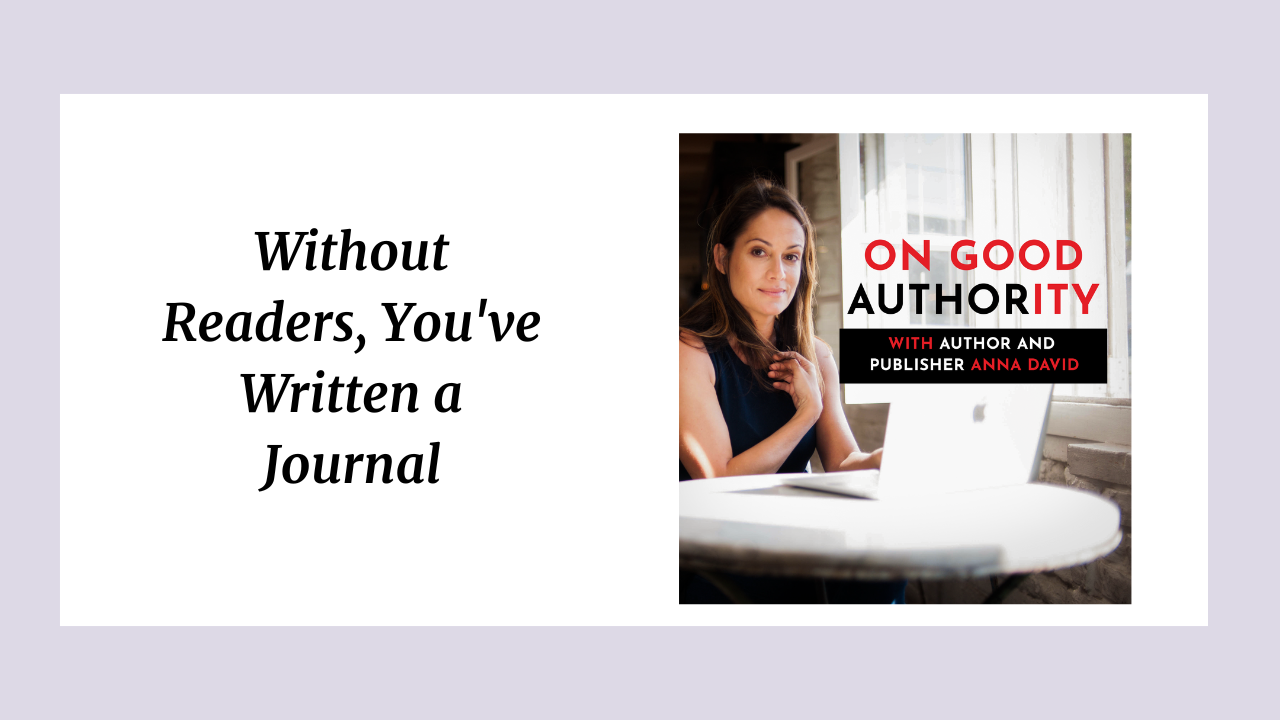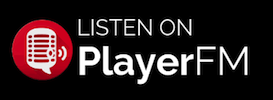
Without Readers, You've Written a Journal
Journals are awesome. Been using 'em since I was six. I've even published a few myself.
But the difference between the journals I've published and the books I've written is that the journals are not meant to be read by anyone once I've filled them with words.
The books are.
But Field of Dreams was wrong! Just because you write it does not mean that they will come.
You have to determine your audience, find them and write a book specifically for them. This episode breaks down how.
It's based on the book I'm writing. Speaking of, if you want exclusive stories, resources and info about this book as I write it, you can sign up for that on annadbook.com.
DOWNLOAD THE PODCAST ON ANY PLATFORM HERE
APPLY FOR A CALL TO WORK WITH LEGACY LAUNCH PAD HERE
TRANSCRIPT:
Anna: Well, hello there. Welcome to the podcast, Anna David here. If you're new to the show, welcome. It's where I talk to authors and entrepreneurs and myself about how to launch a book that will actually build your authority and not just sit on your shelf. So, this is another solo episode based on the book that I am currently writing. And if you want to sign up to get more information, a front row seat as I move towards launch, where I'm sharing all the latest stuff that I'm doing, just go to www.annadbook.com, and you shall be added to that list.
So, today's episode, I am focusing on the number one most important thing when it comes to a book, as well as the number one thing that most people ignore. And that is that you need an audience, if you're going to launch a book.
Take it from somebody who did six books without ever thinking about an audience. One, a novel based on my recovery, one a fictionalized version of a details magazine story I wrote about prostitution, one on reality shows, why not, one on less. There was no consistency, there was no thinking about, I did a book on reality TV without bothering to think, oh, hey, reality TV fans want to watch reality TV and not read books about it. And you know what, people who don't watch reality to TV probably don't want to read a book about something they don't care about.
So, I cannot explain the importance of this, and if you're familiar with Bernie, my cat, he certainly agrees because he's crawling all around. He wants you to have readers. I often say without readers, you've written a journal. So, the delusion that we all suffer from in previous episode about rose colored glasses, I talked about how we all secretly think we're going to be the exception, even though we hear, oh the average book sells 300 copies, we kind of just go well, but you know what, you know what? I've always kind of thought I was like going to do well, you know what I mean? And you know, she's very fabulous. And Guido meets with Kamala Harris and sells millions of copies without someone to do it. I could do that, too. No, no.
You know, the very first agent I ever talked to you who was a complete douchebag, and really, frankly, quite creepy, said something to me that has always stuck with me, which is I said, I want to do a book of essays, because Sex in the City was both a very big book and big show at the time. And I said it could be like Sex in the City. And he said, never compare yourself to the exception. Compare yourself to the rule. You can always be pleasantly surprised if you are that lotto ticket that happens to win. But it's probably not going to happen. So certainly go into it expecting that.
So how on earth do you find readers? The bad news is that it's all that stuff that you're probably not comfortable doing, which is audience building. The good news is that you're not alone. We all hate it at first. And then just like you hate running on the treadmill, the very first time you did it and then you do more, and then you don't hate it. And then one day you find yourself kind of craving that treadmill. I wouldn't say I ever crave audience building, but I look at it as another way to share what I'm passionate about with people who are also passionate about it.
So, it requires a lot of work at first to get anyone to care. And it's very easy to compare and despair and say, oh, this person has 10,000 followers and I don't have any. Well, everybody started with the same amount, which is one. So just start and the fewer people there are, the more you can experiment and take risks and not worry. So this whole concept of the riches are in the niches, is that you want a group of people who will feel like the book that you've created is just for them.
When I was writing, Make Your Mess Your Memoir, which is the last book I wrote before the one I'm currently writing, I thought about two people as I wrote. They're married to each other. And I apologize if you've heard me talk about this on the show before, but they are my surrogate parents. Not really, they're not old enough. And they haven't totally agreed to this, but I know them from Genius Network, this Mastermind I'm a part of, and they're just lovely. I've just always loved them. And years and years ago, they said, you know we need to, they’ve done a book, but we need to do another book. You know, maybe we'll hire your company to do it. And I said that would be great. And then nothing happened. And then, you know, we were working with other clients, I forgot about it. But then when I sat down to write Make Your Mess Your Memoir, I thought about them. And I thought about them not once, not twice, but pretty much every page. I said, would that speak to them? Would that speak to Michael and Ros? Would they be offended by that? Would they understand that? And I thought about them on every page.
And when the book came out, you know, I was lucky enough to get on Good Morning America. And lots of people read the book and lots of people hired my company. Now when I say lots of people, I don't mean hundreds, I mean that we have this very high-ticket expensive offer. So just 10 people hiring us as a result of reading that book, is a year's worth of business.
Michael and Ros, they didn't read it. They didn't even know about it. Maybe two years later, no, I know exactly when it was, it was from the time I’m recording, a year ago, I run into them, at a Genius Network thing. And I say, oh my God, I have the funniest thing to tell you. I wrote a book for you guys. And they just go, what? And I said, I know, it's crazy, but whenever I write a book, I try to think of one person or two people, and I just thought of you guys on every page. And they said, what is this book? And I said, oh, it's over in the gifting suite. And they went and got a copy. And guess what, they hired us, we're now working on their book. That's really like a cute story and they're adorable people.
But the point is, it’s so much easier to write for one person or a very small group of people. Because if there's one of them, there's many. I've also said before, I would rather have 100 people read my book and be completely moved by it, and hire my company than 10,000, who don't really care. So, if you have 100 people, and they feel like it's written for them, you know what happens when you feel like something, think of something that was the, you know, creative work that you liked so much, that you kind of felt like it was made just for you. I know, I felt that way about the show Girls, and the show White Lotus, and many books that I've read.
Now what happens, you start recommending it to everybody, because it kind of feels like it's yours. And what means more, when someone recommends a book or when the author recommends their own book. It means a lot more if it's someone else. So, if you can write something that's so specifically for a certain group of people, they will then become your salespeople. They will go out and start doing your work for you by telling everyone else they have to read it.
So, if you're worried that the niche you're writing to is too small, the example I like to use is there is a Facebook group that is called, A Group Where We All Pretend to Be Ants in an Ant Colony. And that has, as of this recording over 1.8 million members. So, your group is not too small. And think about your own experiences.
I think a lot of us are scarred a little bit by these English teachers who taught us these very rote ways to write papers. And we learned along the way that like we needed to sound smart. Sounding smart is great, but sounding “smart” can lead you to speaking writing cliches, and right in this very professorial language that doesn't endear you to anybody, and is usually quite boring.
So, my favorite writers are the ones who have a voice. Lean into your voice and think about your own experiences. My favorite compliment I ever get from anyone who reads one of my books is, if it’s someone I know, I felt like I was hanging out with you for a week, it was like going on vacation with you. And I love that. And keep in mind that controversy. You can't be too you, you know. You know, you do you boo. You can't do it too much. Think of Mark Manson, the author of The Subtle Art of Not Giving a F*ck, who sold 12 million copies by telling people they shouldn’t give a fuck. So the advantage of being you in front of this audience that you're building is that you're finding out what they like. You're finding out what they respond to.
And by building I'm talking about being on social media, I'm talking about creating a newsletter list and gathering people to it. I'm talking about joining groups, you know, whether that's on Facebook or Reddit or Discord or frickin Mastodon, which I've never been on, don't even know how to spell, but apparently, it's a thing. Get out there. And you'll find that some things people respond to, some things people don't respond to at all, and some things people go crazy for. When you hit on that, you know, you're finding your audience. Double down on that.
And I look at it as a creative thing rather than going, oh my God, what do you mean, I have to toast about building authority through a book if I want to establish my authority around it. How about it's a creative exercise, I'm a creative person, I wouldn't be writing books if I wasn't. So why don't I use some of my creativity in order to build my audience.
Now an example that I give in my book that's On Good Authority, which you can sign up for a front row seat by going to www.annadbook.com. I talk about my friend Jennifer Keishin Armstrong. Now she's a New York Times bestselling author of many books that are about entertainment. She worked at Entertainment Weekly. And her first book was about the Mickey Mouse Club. So, she writes this book, and she goes, and she tries to find like Boomer websites on Facebook, and she can't summon up interest. Then she goes home to Chicago, and her dad takes her to one of his veteran organization meetings. And she finds her audience and they're like, oh my God, Darlene tell me, I don't know who any of these people are. I love it when I can say this, but Mickey Mouse Club was before my time. But so, she finally found her readers, and only realized the importance of finding her readers when the book was out.
So, Dave Chesson, previous podcast guest, all around the amazing person. When I had him on this podcast, he talked about how, go to the Amazon search box, type in your topic. The example he told me about is a woman he was helping with her book, and she was selling art. And she was writing a book about that. That was what she knew about. That's where she was building her authority. So she goes to Amazon, she types in, how to sell art online. No, no, she's sorry, she types in, how to sell art. What pops up is how to sell art online. She's like that people care about, I didn't know that. So, she not only adds a whole bunch to her book about how to sell art online, but she creates a lead magnet, about how to set up your accounts on online art sales platforms.
Now, Jay Abraham, who was both on the podcast and is quoted in the book, and is a genius, like the father of marketing, wrote an amazing book called Getting Everything You Can Out of All You've Got. What he recommends, is go to your you could call them your competitors’ books, go to the books that are on topics like yours. Look at the five-star reviews. What did they say? Then go to the one-star reviews, the two star reviews. I actually find like a three, a two- or three-star review more useful because a one-star review, like I'm sorry, those are dicks, those are people who need to get out of basements or deal with whatever resentment it is that it's making them take out their power on an author who's put their work out there.
But look what people respond to very passionately, whether they're very happy or unhappy with something. They use language, that as Jay Abraham says, penetrates right past the conscious mind. And you know how I was talking about people feeling like a book was written specifically for them? You're using their language; they are going to feel that it's really easy when you know a lot about something and you're writing a book about it. We let expert blindness literally blind us. We know how something works. So, we assume that the people, the readers know our language, speak about it the same way. We assume they understand something they don't, because it's really hard, if not impossible to remember to break it down and remember when you learned something, and when you didn't know it.
An example from publishing is in traditional publishing, people when they say blurbs, they're talking about endorsements. A blurb is a recommendation from a luminary about your book. I noticed when I got more invested in the self and indie publishing world, that when people said the word blurb, they actually were using what they were calling book descriptions blurbs. I don't know how it happened, but it started to happen. So rather than me sticking to what I know is “right,” I'm going to be better off using the language that my audience uses. And it's really hard to break things down.
I'm always reminded of one of my favorite movies, Reality Bites. If you haven't seen it, well, if you're a Gen Xer, you know what I'm talking about, if you're not a Gen Xer, it’s a frickin amazing movie. And if you ever want to understand the Gen Xer in your life, just go see that movie. But there's a scene where Winona Ryder gets in the elevator with Anne Meara and she's just interviewing for an internship, or a job and Anne Meara says define ironic. She's like, oh, you know, it's like when something's ironic, you know. And then of course Ethan Hawke who plays Troy Dyer, this sanctimonious dick, who she's in love with, he can of course, define it perfectly.
But the point is, it can be really, really hard, if not impossible to describe things that you're so familiar with, that you don't need to describe them. So that is what you can learn about from your audience. And from those one- and five-star reviews and from all the audience building that you're doing.
So that is that. That is all about the importance of readers. I hope you got a lot out of this episode. Find out, you know, like I said, more about this book that this is from, get a front row seat, find out all the tips, tricks and techniques that I am using to launch this book and you can use for your own at www.annadbook.com and I will talk to you next week.
















